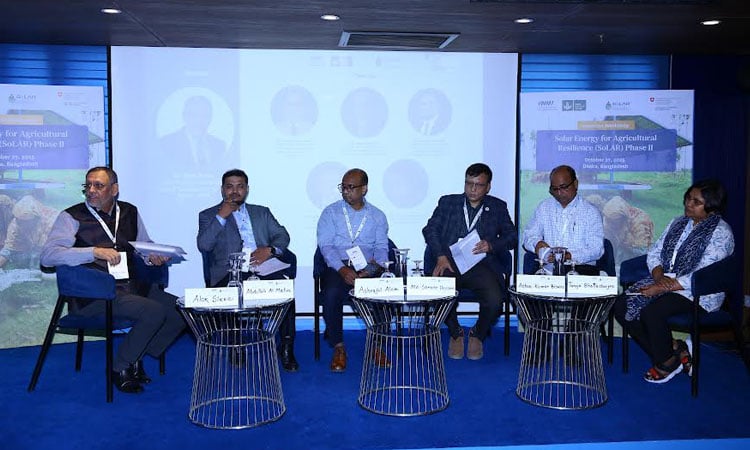News Flash

DHAKA, Oct 27, 2025 (BSS) - The International Water Management Institute (IWMI) today staged an inception workshop to promote solar power for irrigation launching Solar Energy for Agricultural Resilience (SoLAR) Phase II in Bangladesh.
“The initiative aims to strengthen the enabling environment and unlock investments for socially inclusive, climate-resilient solar agri-tech solutions,” IWMI said in a statement following the workshop joined by concerned government organizations and non-government and private stakeholders.
It said the first phase of the SoLAR programme, the IWMI’s research in Bangladesh provided critical insights into the transition from diesel to solar-powered irrigation while The SoLAR phase II programme was built upon the success of first phase in South Asia.
“SoLAR Phase II is not just about replacing diesel pumps with solar ones,” the statement quoted IWMI’s senior researcher and project chief Dr Darshini Ravindranath as telling the workshop.
She added the Phase II was about “reimagining how we use energy for agriculture in ways that benefit farmers, reduce emissions, and build resilience to climate risks”.
According to the statement the workshop participants discussed key strategies to accelerate solar financing, scale innovative models such as agrivoltaics, and integrate capacity-building and policy support under the SoLAR Phase II framework.
IWMI, a global research organization addressing water challenges in developing countries with governments, civil society, and businesses, said it now expected to expand in East African countries like Ethiopia and Kenya through South–South collaboration.
According to IWMI and Bangladesh’s Infrastructure Development Company Limited (IDCOL) studies found that solar Irrigation pumps is not only cut diesel use but also reduce farmers’ irrigation costs by 20 to 30 percent.
The studies found the solar power proved to be time-saving and labour-efficient irrigation service which simultaneously ensures access to supplementary irrigation during delayed monsoons.
Irrigation in Bangladesh is still mostly depended on imported diesel, prompting the country to invest in solar irrigation pumps (SIPs) to enhance energy security and reduce greenhouse gas (GHG) emissions.
The IWMI organized the inception workshop of the SoLAR Phase II in a hotel with Swiss Agency for Development and Cooperation (SDC) supports.
Representatives of Bangladesh Agricultural Research Council (BARC), Bangladesh Agricultural Research Institute (BARI), Barind Multipurpose Development Authority (BMDA), Bangladesh Rice Research Institute (BRRI), Bangladesh Agricultural Development Corporation (BADC), Bangladesh Rural Electrification Board (BREB) and the Sustainable and Renewable Energy Development Authority (SREDA) joined the workshop.
The statement said development partners, research organizations and private sector stakeholders as well participated in discussions on pathways to scale solar-powered irrigation and strengthen the energy–water–food security nexus in Bangladesh.
The IDCOL-promoted fee-for-service model, a pioneering public–private partnership approach, has proven effective in delivering affordable irrigation to smallholders while attracting private sector investments.
Ravindranath said the programme placed strong emphasis on social inclusion —empowering women, youth, and marginalized communities to access and benefit from solar agri-tech solutions.
“Our learnings from Phase I in the Gaibandha chars and Thakurgaon districts show how women using portable micro–solar irrigation pumps have gained both time and opportunity -- freeing up hours once spent on domestic tasks and enabling participation in income-generating activities such as fisheries,” she added.
IWMA country representative for Bangladesh and India Dr Alok Sikka emphasized the importance of partnerships in driving the transition adding that Bangladesh’s initiative to promote solar irrigation offers a unique opportunity to align energy, water, and climate goals.
“Through SoLAR Phase II, IWMI and its partners aim to co-develop practical solutions—such as innovative financing models and solar suitability mapping—to ensure that the transition is both sustainable and inclusive,” he said.
He said the IWMA research across South Asia suggested right incentives and governance frameworks for solar irrigation could actually promote sustainable water solutions-transforming it into a tool for climate resilience.
“Agriculture is the backbone of Bangladesh’s economy, and irrigation has been central to achieving self-sufficiency,” BARC executive charment Dr Nazmun Nahar Kari said joining the workshop as the chief guest.